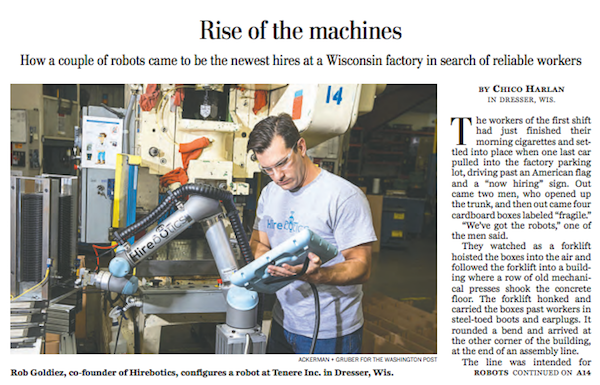
08/11/2017
The Washington Post included a front-page story about automation on Sunday, and it admitted “the surrender of the industrial age to the age of automation continues at a record pace.”
But the cause was mostly laid at the feet of the workers themselves rather than complex forces of globalization that have been accumulating for decades. The workers are blamed for being late, drunk, stoned and having bad work attitudes which may certainly be true in some cases. But the pay is poor and there is no opportunity for advancement. No mention is made of retraining for more technical jobs that could provide a step up. Wages start at $10.50/hour for day work and $13 for night shifts.
But the article further admits that “even the lowest-paid worker was more expensive than the robots” yet blaming the victims is a theme that runs throughout.
Hopefully an upcoming Post article will examine the bad attitudes of newspaper workers facing advanced new technology that automates news story writing to cut costs in newsrooms with far fewer humans.
Rather than blame the dispirited workforce, there are many more issues about automation that the Post could have examined for the benefit of readers. Like how is society supposed to function when a third to a half of the workforce is unemployed in less than 20 years or more in decades beyond, as forecast by tech experts? That topic would fill lots of column inches and could be composed by a software robot.
Another subject: why should America continue to import immigrant workers at all when most will be redundant in the near future? Automation makes immigration obsolete, just like homesteading.
Rise of the machines, Washington Post, August 5, 2017How a couple of robots came to be the newest hires at a Wisconsin factory in search of reliable workers
By Chico Harlan in Dresser, Wisconsin
The workers of the first shift had just finished their morning cigarettes and settled into place when one last car pulled into the factory parking lot, driving past an American flag and a “now hiring” sign. Out came two men, who opened up the trunk, and then out came four cardboard boxes labeled “fragile.”
“We’ve got the robots,” one of the men said.
They watched as a forklift hoisted the boxes into the air and followed the forklift into a building where a row of old mechanical presses shook the concrete floor. The forklift honked and carried the boxes past workers in steel-toed boots and earplugs. It rounded a bend and arrived at the other corner of the building, at the end of an assembly line.
The line was intended for 12 workers, but two were no-shows. One had just been jailed for drug possession and violating probation. Three other spots were empty because the company hadn’t found anybody to do the work. That left six people on the line jumping from spot to spot, snapping parts into place and building metal containers by hand, too busy to look up as the forklift now came to a stop beside them.
In factory after American factory, the surrender of the industrial age to the age of automation continues at a record pace. The transformation is decades along, its primary reasons well-established: a search for cost-cutting and efficiency.
But as one factory in Wisconsin is showing, the forces driving automation can evolve — for reasons having to do with the condition of the American workforce. The robots were coming in not to replace humans, and not just as a way to modernize, but also because reliable humans had become so hard to find. It was part of a labor shortage spreading across America, one that economists said is stemming from so many things at once. A low unemployment rate. The retirement of baby boomers. A younger generation that doesn’t want factory jobs. And, more and more, a workforce in declining health: because of alcohol, because of despair and depression, because of a spike in the use of opioids and other drugs.
This is a content archive of VDARE.com, which Letitia James forced off of the Internet using lawfare.